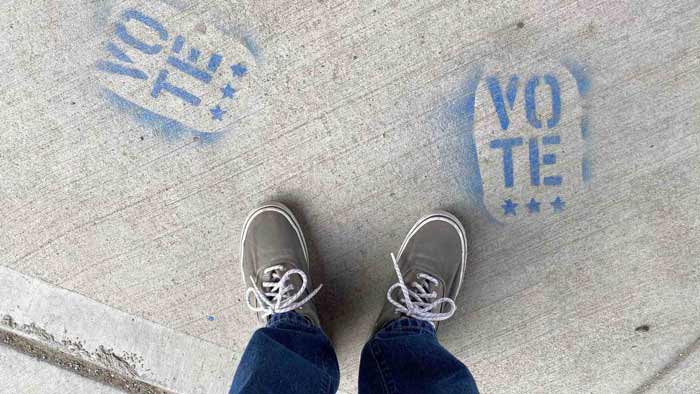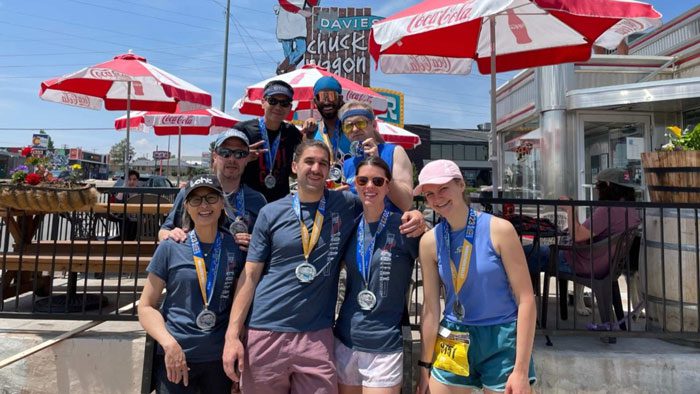Human trafficking is prevalent in every region of the world. The 2023 Trafficking in Persons Report shared that globally, 115,324 survivors of trafficking were identified in 2022, the majority of which were sex trafficking cases. There were 15,159 prosecutions that led to just 5,577 convictions.
The reality is that these numbers do not reflect the full picture and actual scale of this human rights violation. A silent crime, human trafficking most often goes undetected or unreported. Survivors may choose not to seek help or self-identify as victims of a crime due to fear of retaliation or lack of trust in law enforcement or social services.
In order to end human trafficking on the global scale, action is needed at every level. Governments need to increase their protections for vulnerable populations, and businesses need to prioritize human rights. On an individual level, helping to tackle such a vast issue can feel overwhelming. How can one person make a difference for this global issue?
Our advice is to zoom in and focus on the local level — this will help to sustainably address human trafficking. How does human trafficking show up in your community? How do your actions unknowingly influence this crime? As an individual, you have more power than you might realize. In truth, locally-driven, grassroots efforts can address human trafficking in our communities better than top-down funding can. Keep reading for six ways you can take action today to help end human trafficking around the world.
Individuals can make powerful contributions toward ending human trafficking. In fact, I started volunteering in this field 20 years ago by making small contributions with my time and skills. You can make a difference by finding an organization that aligns with your values. Explore their website and social media and ask them what they most need. Amanda Finger, Executive Director and Co-founder, Laboratory to Combat Human Trafficking

1. Educate yourself and others.
Knowledge and awareness about human trafficking provides a strong foundation for you to take action from. Take time to learn about the root causes of this human rights violation, which industries it most commonly happens in, and who is most vulnerable to exploitation. Whenever possible, learn directly from survivors — their voices are powerful.
Read the 2023 Trafficking in Persons Report
Know what resources are available in your area to help potential survivors, and consider organizing an anti-trafficking training for your organization or community group, especially if you might encounter survivors in your everyday work (such as in a medical, law enforcement, or social services setting). If you suspect a client or loved one’s being exploited, you can always reach out to our 24/7 Human Trafficking Hotline to learn how to respond.
As you learn about human trafficking, talk to your neighbors, coworkers, family members, and friends. Some of them might not even know that human trafficking is an issue that affects your community. Invite others to join you in learning more (IDEA: share this blog post with them!).

2. Volunteer in your community.
Find a cause that you are passionate about, and get involved. It might be an anti-trafficking organization, or it might be something else. Consider volunteering with one of our amazing partners, including The Gathering Place, Envision:You, or Art From Ashes. All social justice issues are connected, and dedicating your time and effort to one of them also makes a difference for others. For example, volunteering with an LGBTQ+ rights nonprofit in your community is a great way to engage in anti-trafficking work.
Whatever your passion is, consider why it matters in addressing human trafficking. If racial justice is your passion, where does human trafficking enter that space? What about education, healthcare, or homelessness? When we consider how issue areas overlap, we partner across movements and sustain efforts for both.
If you are looking for a remote volunteer opportunity, consider becoming a Hotline Advocate for our 24/7 Human Trafficking Hotline. You’ll field calls and texts from survivors or individuals reporting tips to connect them with the help they need.

3. VOTE!
Do some research on your local candidates and make sure you are supporting those who are willing to support and prioritize anti-trafficking legislation and policy — as well as human rights. Learn about their stances on the issues that intersect with human trafficking, including homelessness, housing insecurity, labor rights, gender-based violence, immigration, mental health, and substance use. Are they committed to strengthening legislation, allocating resources, and creating support systems that protect vulnerable populations? What will they do to address human rights violations? These are the elected officials who will create policies that protect survivors and prosecute perpetrators, on a city, state, and national level.
4. Have conversations with youth.
Globally, children make up 27% of all human trafficking survivors (Source: Save the Children). If you have kids in your life or interact with youth in a professional setting, you are in a position to teach them how to stay safe. Talk to them about online safety, being aware of strangers on social media, and protecting their personal information. Proactive, open conversations go a long way.
When young people you know are searching for work, share these core ideas with them:
If you do the work, you should be paid in a timely manner as promised (not six months later, for example).
You should be able to get a copy of your pay stub and know exactly what each deduction is for.
If someone offers you a job that feels too good to be true, it most likely is.
Finally, make sure the young people in your life know that they can always come to you for help. Let them know that no matter what the circumstances are, and even if they made a mistake or feel ashamed, you will be there for them.

5. Shop and travel consciously.
Consider how the goods and services you use might fuel exploitation, both locally and globally. Go through each of your expenses and determine the individual or business you are paying. What do you know about where the goods come from and how ethical their labor practices are? Do some research and ask questions. You might uncover some surprising truths.
For example, where do you get your produce and groceries from? What about the clothes in your closet? How do the nail salons, daycares, restaurants, and cleaning services you use treat their employees?
Check out these resources to research how ethical a brand’s practices are:
- Better World Shopper, a Boulder-based public research project for ethical consumers.
- The Good Trade provides ethical and sustainable shopping recommendations.
- Ethical Consumer rates big brands to empower you with your shopping choices.
- Google, Yelp, and other online forums like TripAdvisor or Reddit can provide valuable insight, too.
Do some extra research before an upcoming trip to make sure you are traveling ethically. Your choices in accommodation, restaurants, and activities matter just as much as your choices in everyday goods and services do. You have power as a consumer and a traveler!

6. Get creative in your giving.
Financial contributions to nonprofit organizations like the Laboratory to Combat Human Trafficking are often the most effective way to make a difference locally. It allows you to fuel existing programs that are designed to help solve the issue. In our case, donations strengthen our 24/7 Hotline, anti-trafficking trainings for frontline professionals, the professional development of future human rights leaders, and community-based research to advance local action. If you are able to donate and want to take action in this way, you can do so here. Donating to other causes that you’re passionate about and intersect with human trafficking make a meaningful difference for both issue areas, too!
We’re so often inspired by the creative ways individuals and businesses choose to give. Over the years, we’ve seen supporters dedicate their birthday and ask for donations instead of gifts, artists donate their sales of creative works, local musicians give event proceeds, and marathon runners race for a cause. Everyone has unique talents, passions, or resources to share!
Sometimes, businesses have goods or services that they are willing to donate. Most recently, Dayspring Pens, a luxury pen company that specializes in custom engraving, gave us LCHT-branded pens, which we intend to share with our next cohort of Leadership Development Program interns. When asked about why they chose to give, the Dayspring Pens team shared, “We knew we needed to make it a part of our business to not just facilitate individuals and companies as they give, but also reach out and support the organizations around the country that are making an impact on their communities.” Business can be a force for good!

Eliminating human rights violations on a global scale requires coordinated efforts at every level. As an individual, you have the power to take action in your community — and inspire others to do the same. Through these tangible ways, we can each contribute to the international fight against human trafficking. Every action we take, no matter how small, has the potential to create waves of change. Let’s stand together and stand up for human rights! Together, we can create a future where every individual lives free from exploitation.

